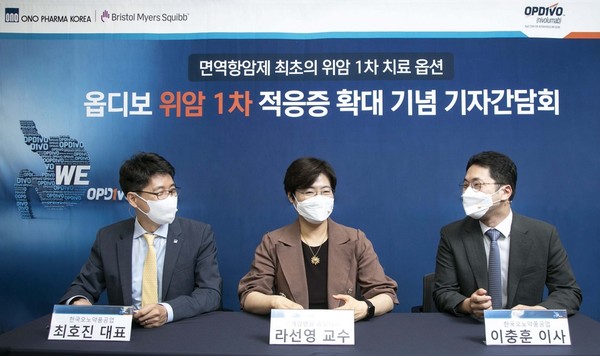Ono Pharma Korea and BMS Korea said Opdivo (ingredient: nivolumab) has improved gastric cancer patients' overall survival (OS) to provide a turning point in the treatment paradigm of cancer immunotherapy.
Professor Rha Sun-young of the Medical Oncology Department at Yonsei Cancer Center introduced the study results, stressing the significance and value of the recent regulatory approval of Opdivo as the first-line treatment at an online conference on Thursday.

"Gastric cancer patients accounted for 12 percent of all cancer patients in 2018, but we lacked an approved first-line treatment for more than a decade, leaving patients and health providers with huge unmet needs," Professor Rha said.
Rha added that the approval of Opdivo as first-line therapy for patients with human epidermal growth factor receptor 2 (HER2)-negative gastric cancer, which accounts for 90 percent of all advanced gastric cancer patients, marked a major turning point as it has drawn great interest from researchers and pharmaceutical companies.
Opdivo has received approval from the Ministry of Food and Drug Safety as a first-line treatment for advanced or metastatic gastric adenocarcinoma, gastroesophageal junction adenocarcinoma, and esophageal cancer, in combination with fluoropyrimidine or platinum chemotherapy.
Rha said Opdivo plus chemotherapy increased the median overall survival period to 13.8 months in the global phase 3 CheckMate-649 trials of patients with HER2-negative advanced and metastatic gastric adenocarcinoma, gastroesophageal junction adenocarcinoma, from 11.6 months observed in the existing studies.
Among all gastric cancer patients who participated in the study, 55 percent treated with the Opdivo combination therapy survived the first year, while 48 percent who only received chemotherapy showed 12-months OS.
The overall response rate (ORR) of Opdivo combo therapy reached 58 percent, up 12 percent than the mono-chemotherapy group.
The study also showed that 10 percent of the patients achieved complete response (CR) with the Opdivo-chemotherapy regimen, whereas 6 percent of those treated only with chemotherapy showed a sustained duration of response (DoR).
Rha said that the biological and clinical characteristics and treatments for advanced gastric cancer differ depending on HER2 expression.
She added that Opdivo plus chemotherapy was used in the CheckMate-649 study to treat HER2-negative advanced or metastatic gastric adenocarcinoma, gastroesophageal junction adenocarcinoma, and esophageal cancer. The drug significantly improved the OS and reduced the risk of death by 20 percent.
"Treating stomach cancer is difficult, and Herceptin and other drugs also provide survival benefit of about two months like Opdivo did," Rha said. "The two-month extension of OS could appear negligible, but I think this is a good start as improving survival period in gastric cancer is challenging, and we can continue to develop better drugs over time."
She also stressed that reimbursement is necessary for Opdivo as it is not easy to explain the expensive treatment cost, which reaches up to 800 million won ($6590) per vial, to patients no matter how excellently the drug works.
"We are glad to provide a novel immuno-oncology as the first-line treatment of gastric cancer, particularly prevalent in Korea and other East Asian countries," Ono Pharma Korea CEO Choi Ho-jin said. "We are discussing with the government and Health Insurance Review and Assessment Service for the reimbursement of Opdivo as soon as possible."
Choi added that the company would conduct further studies of Opdivo in Asia.

